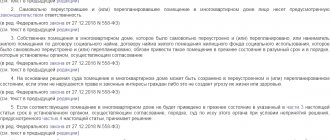Home » Purchase and sale of an apartment » Statement of claim for discharge from the apartment
13
In some cases, it is not possible to evict tenants from an apartment voluntarily. They refuse to be discharged and therefore cannot be deprived of the right to live in the premises. In the vast majority of cases, such a problem can only be resolved through the courts.
Grounds for going to court
The property owner must have compelling reasons to evict people from the apartment. The list of such grounds is quite extensive, but most often they use the simplest and most basic ones, which are easiest to prove with documentation. Let's look at the main reasons for eviction.
Registered, but does not live in the apartment
A fairly common option. The registered person does not appear in the apartment where he is registered and, in fact, lives at a different address. Since by law a person is required to be registered at his residential address, under such conditions he can be forcibly discharged.
There are exceptions to this rule. Often a person needs to go to another city for a relatively long time or simply move to a different address. There can be many reasons, ranging from the need to care for an incapacitated relative to study, work or a long business trip. In all such cases, a temporary registration is issued, which does not exclude permanent registration. It will be impossible to discharge such a tenant.
Example: An individual registered in an apartment goes to work in another city. There he is given a temporary registration. The owner of the apartment to which the person is registered, taking advantage of his absence, decides to discharge the tenant. The court, having examined the case materials and checked the availability of temporary registration, rejects the claim.
The tenant does not fulfill his obligations to pay utility bills
In the vast majority of cases, residents are required to pay for the utilities they consume. Since it is usually impossible to calculate who consumes what and how much, most often the total payment amount is simply divided among all registered residents. As a result, each of them is obliged to contribute a certain amount.
If there are other agreements between the tenant and the owner, for example, the owner owes the tenant a large amount, it is quite possible that the parties agree so that the owner pays the full cost of utilities for himself and the tenant until he pays off the debt. Any such agreements must be documented.
In case of failure to fulfill obligations (for example, failure to pay utility bills), the tenant can be forcibly discharged from the apartment. It is important to remember that the amount of debt must be truly significant. It will not be possible to discharge a person just because he did not pay one time for utilities. You need at least 3-6 months of debt or more.
The tenant constantly disrupts the peace
Some people ignore the rights of others and regularly violate public order. Most often this is expressed in loud music or screaming at night, regular drinking sessions, fights, and so on.
If for residents this goes from the “occasionally” section to the “every day” section, then after collecting testimony from neighbors, you can go to court and forcibly discharge such residents.
Under such conditions, most often one discharge is not enough for people to leave the premises they occupy. They simply refuse without going into details. You can force them to evict with the help of the bailiff service.
Use of the apartment for other purposes
If a tenant uses the apartment or one of the rooms for other purposes, he can also be evicted. Sometimes the premises are turned into warehouses, confectionery shops, offices and so on. All this is not the intended purpose of housing. As a result, if you can prove this fact, you can achieve the forced discharge of residents.
Example: A young family rented an apartment. Ostensibly in order to live in it. They received temporary registration and, as a result, the right to live in the premises. But in fact, the apartment is used by the family to store goods from their own store, which is located in the same building. There is no storage space in the store and the family got out of the situation in this original way. Having learned about the problem, the owner can go to court and, if he can prove the fact of misuse of the premises, the tenants will be forcibly evicted.
Causing intentional damage to the property of the owner
Residents are required to respect the owner and his property. It is clear that sometimes some objects can be accidentally destroyed or damaged (for example, a broken table or chair), but if this becomes the rule and the tenant deliberately, deliberately breaks everything he can reach, then by proving such a fact, a person can be evict.
You must always remember that the court will consider the owner’s application only on the basis of evidence. Simple words will not help here. We need documents, photographs, video footage, audio recordings, testimony from neighboring witnesses, and so on.
Exclusion of family ties
Most often, relatives live in apartments together. However, under certain conditions, family ties can be terminated. This happens, for example, when people get divorced, lose parental rights, and so on. In such a situation, from the point of view of legislation, they begin to be considered strangers to each other. As a result, the owner can forcibly evict former relatives (parents, ex-husband/wife, etc.) on the grounds that they simply do not have the right to live in this apartment.
Among all the reasons/reasons, this is the easiest to prove. The fact of deprivation of parental rights or divorce is documented. It is enough to provide such a document and the court will most likely side with the plaintiff.
However, there are exceptions to this rule. Thus, it will not be possible to register those persons who are co-owners of the apartment or who can lay claim to it.
Example : Spouses, immediately after the wedding, purchase an apartment. It is registered in the name of the husband, the wife does not appear anywhere in the documents, although the spouses collected the money to buy the home together. After some time, the need arises to dissolve the marriage. The ex-husband, taking advantage of the fact that he is the official owner of the apartment, wants to sign out and evict his ex-wife. However, according to the law, almost any property (including real estate) that was acquired during marriage at the expense of the family budget is the common joint property of the spouses. This rule does not disappear due to divorce. As a result, a woman can claim half of the apartment and, in fact, is its co-owner. The court will reject such a claim.
On what grounds can tenants be discharged without going to court?
The grounds described above and many other reasons require going to court for forced eviction (without the consent and presence of the tenants). However, there are a couple of reasons for forcibly deregistering a person without going to court:
- Serviceman.
- A prisoner.
Both can be written out without going to court. The fact is that employees and prisoners are registered at the place of service or place of imprisonment. However, after the end of their term of service/imprisonment, such persons have the right to request restoration of their registration.
Legal Information
When moving to another place of residence, a person must check out from the previous one. This obligation is enshrined at the legislative level. The reasons for eviction can be very varied. Their full list is reflected in Art. 7 of the Law of the Russian Federation of June 25, 1993 No. 5242-1:
- Moving to another city, region, etc.;
- Finding yourself in an unknown place;
- Death of a citizen registered in the apartment;
- Loss of the right to use living space;
- Illegal registration;
- Change of nomadic routes;
- Stopping the wandering lifestyle;
- Detection of fake registration.
How to write a claim for ejectment from an apartment
The statement of claim consists of several main parts, which should be filled out in strict accordance with Article 131 of the Code of Civil Procedure of the Russian Federation.
Document header
In this section, the applicant must provide the following information:
- Details of the court where the claim is being sent.
- Own full name, place of residence and contact information.
- Information about the defendant similar to the above (to the extent that the plaintiff knows about him).
- Similar information about the representative, if required.
Example : In the Enny District Court, Ensk. Plaintiff: Ivanov Ivan Ivanovich, place of residence: Ivanova St., 1, apt. 1., telephone: +79000000000. Defendant: Petrov Petr Petrovich, place of residence, Petrova St., 1, apt. 1, telephone: +79999999999. Representative: Vasily Vasily Vasilievich, place of residence: Vasilyeva st., 1, apt. 1., telephone: 79888888888.
Basic information about the current situation
In this part of the claim, the applicant describes the current situation, his actions, if any, the characteristics of the relationship with the tenants, the basis for eviction, and all this is confirmed by evidence (attached to the claim). It is almost impossible to give a specific example, since situations can be very different. Below is a sample of eviction from an ex-husband’s apartment, you can use it as a guide.
Requirements for the defendant
This part of the claim describes specific claims. Most often it will be something like “Deregister.” In some cases, additional demands may be made, such as compensation for damage caused or moral damage.
List of documents, date and signature
This section includes a list of all documents attached to the statement of claim (mainly evidence, but not only), the plaintiff puts the date and signature. See below for more details.
How to write an application?
To fully understand the correctness and subtleties of filling out an application for deregistration, you can use the following sample applications:
- Application for voluntary deregistration of a person;
- Statement of claim.
Each of them can be used as a hint for drawing up your own documents, taking into account the existing situation.
Sample application for discharge from an apartment
.
Filling out will not be difficult, since you only need to fill in your data, information about the body to which the application is being submitted, and, if necessary, the last name, first name and patronymic of the legal representative.
Submission rules
When submitting an application, you need to take into account certain rules:
- Even before going to court, you need to try to solve the problem voluntarily (out-of-court). To do this, you should send a claim to the potential defendant (for example, by registered mail) with specific requirements, which will subsequently appear in the statement of claim. In this complaint, you should indicate a response time (for example, 1 month) and wait for a response. In some cases, this helps solve the problem, but most often such a document is needed only to show the court the plaintiff’s attempt to cope on his own. Even if it was unsuccessful.
- When filing an application, the court clerk must require a document confirming the receipt of the claim or a copy of the application with a receipt stamp. This will help resolve controversial issues in the event that the court loses the documents (this rarely happens, but there is always some probability of such an outcome).
- The court does not discharge the tenant on its own. It only issues the appropriate decision. With it and other papers, the applicant is obliged to personally deal with this issue. But he cannot independently and forcibly expel residents from the apartment. With documents confirming the fact that people have been deregistered, the owner must contact the bailiff service and demand that they evict the residents.
Petition part
An application to the court for an extract must contain a correctly drawn up petition part, otherwise delaying the process or other problems cannot be avoided. Typically, it is recommended to formalize a request to be discharged from an apartment in two points:
- Recognize Marina Alekseevna Ivanova as having lost the right to use the residential premises located at the specified address;
- Oblige the Department of the Ministry of Internal Affairs for St. Petersburg to remove Marina Alekseevna Ivanova from registration at the place of residence in the residential premises located at the specified address.
Procedure for filing a claim
Instructions for going to court:
- File a complaint against tenants/residents.
- Send the claim by registered mail or transmit it in any other way. It is important that there is confirmation of the transfer. For example, the presence of a witness.
- Wait for a response or wait the period specified in the complaint.
- If the tenant has not responded to the claim, file a statement of claim (a sample is presented above).
- Collect the remaining necessary documents, including evidence of the plaintiff’s innocence.
- Submit a claim and documents to the court.
- Wait for the meeting date.
- Attend the court hearing.
- Get a solution.
- Wait for the decision to take effect. If required, you can file an appeal at this time.
- With the decision that has entered into force, contact the department of the Ministry of Internal Affairs, the MFC or the passport office.
- Fill out an application for compulsory deregistration by court decision.
- Wait until the application is processed.
- Obtain documents confirming the fact that residents have been discharged from the apartment.
- Based on these documents, require the residents to move out of the apartment.
- If they refuse to evict, contact the Bailiff Service (Bailiff Service).
Extract via the Internet on the government service website
Today, in order to save time, you can use the services of an Internet service. To do this you need:
- register on the Unified State Portal. and municipal services;
- log into your personal account and follow the “Public Services” link at the top of the page;
- From the list provided, select the “Removal of a citizen from registration” tab.
First of all, an agreement will be proposed, which gives permission to process personal data, then the region in which the service will be provided is selected, and then the citizen’s age of majority is confirmed. Then you will need to fill out a form reflecting personal data: full name, date and place of birth, information about the identity document, the date and authority that issued it. The person filling out the form must also indicate his citizenship and whether he has (had) citizenship of another state.
After this, you should indicate the reason why you need to check out of the residential premises, and whether there is other housing in which you can register. Mandatory data includes the form of employment, whether the citizen has the right to receive any type of social security, his education and marital status.
At the end of the procedure for submitting an application for deregistration, you must indicate which body has been selected to submit the application. As soon as the last page of the form is completed, an email will be sent to your email address indicating the date and time, as well as the exact address where you will need to present your identification document to complete the deregistration procedure.
It is important to know! Submitting an application in electronic form does not relieve the need for personal appearance (or the appearance of a representative with a notarized power of attorney) to the registration authority. However, in any case, this is an excellent opportunity to save time when submitting documents and avoid queues.
Documents attached to the claim
All documents that are attached to the claim can be divided into 2 categories: mandatory and evidence. In principle, evidence can also be considered mandatory documents, but in fact, a claim without evidence will be accepted, but without a mandatory copy of the applicant’s passport, it will not.
Required documents:
- A copy of the applicant/applicants' passport.
- Receipt for payment of state duty.
- Copies of documents confirming the ownership of housing.
The list of evidence can be very extensive, and many positions depend on the current situation. A sample list of probable evidence might look like this:
- Testimony of neighbors' witnesses. They can be present in court in person, they can write the appropriate paper, they can be filmed, and so on.
- Documents (divorce certificate, certificate from the management company about rent arrears, etc.).
- Photographs, audio recordings and video recordings of violations that became the basis for going to court.
- Confirmation of the fact that the person does not live in the apartment. This evidence is the most difficult to collect, since there is no clear understanding of what such a document could be. It is best, if possible, to contact the passport office at the place where the defendant is supposed to live and ask for a certificate stating that the person lives at a different address. But if he was not officially registered there (thus violating the requirements of the law), then there will be no documents at the passport office.
Grounds for removing a person from home without his consent
Since a private house is a residential premises and ensures a citizen’s constitutional right to housing, a person’s discharge from it without consent should only be carried out by decision of a judicial authority.
However, if there are no sufficient grounds for deregistration, then not a single judge will take your side and satisfy the claim.
Expert opinion
Stanislav Evseev
Lawyer. Experience 12 years. Specialization: civil, family, inheritance law.
These are the grounds for deregistration from a private home:
- actual long-term absence from the place of registration;
- intentional destruction of a house or its parts;
- maintaining an antisocial lifestyle;
- violation of the rights of people living together with a registered person;
- reprivatization of the house itself or conversion of the plot on which it is located in favor of the state;
- loss of family ties (divorce, challenging paternity, etc.);
- change of owner of a residential building;
- debt to pay utility bills (more than 6 months, if personal accounts are separated).
It must be remembered that no matter what reason for deregistration you indicate in the statement of claim, it will have to be proven with documents and witness testimony.
State duty
Claims of this type are classified as non-property. As a result, based on paragraph 3, paragraph 1. Article 333.19 of the Tax Code of the Russian Federation, the state duty will be 300 rubles. These are all major expenses that cannot be avoided. But besides these, there may be additional costs.
Other expenses
Most often, additional costs are divided into the costs of issuing a power of attorney for a representative (about 2-5 thousand rubles) and any other costs for collecting evidence. Starting from hiring a person who will monitor the actions of the resident and ending with the acquisition of the necessary equipment for video filming.
Legal grounds
Accommodation in an apartment or room is provided for various reasons. For example, directly by the owner in relation to his family members, by testamentary refusal, maintenance agreement with dependents, rental and other agreements and acts.
In some cases, the right of use is terminated: the owner changes, the family breaks up. Art. 35 of the Housing Code of the Russian Federation gives the owner of real estate the full right to evict a tenant from the occupied area who has lost the basis for occupying his square meters.
Time limits for forced discharge through the court
Approximate time frame for discharge through the court:
- Filing a claim and waiting: about 1 month, the period can vary arbitrarily at the request of the potential plaintiff.
- Collection of documents and evidence: from 1 day.
- Waiting for a court hearing: up to 2 months.
- Waiting for the court decision to come into force: exactly 1 month.
- Compulsory discharge through the MFC, passport office or Ministry of Internal Affairs: from 3 days.
- Actions of the SSP, if necessary, to forcibly evict tenants: from 1 week or more.
How to expel a non-owner from a house without consent through the court
Is it even possible to discharge a person registered in the house if he does not want to?
The legislator provides such an opportunity. In principle, this procedure is not very different from the similar one for checking out of an apartment, however, there are some nuances that you need to know about in advance.
If the registered person does not give consent to eviction, then you must go to court. It is not worthwhile to apply any measures to this person on your own, since a criminal case may be initiated against you under Art. 330 of the Criminal Code of the Russian Federation.
Controversial issues and features
There are a couple of main controversial issues that occur most often and often become the reason why the applicant’s claim is denied. Let's take a closer look at them.
Discharge of an incapacitated or minor person
Such persons cannot be discharged “to nowhere.” Moreover, they are required to be discharged only with their parents/guardians and for this they must obtain permission from the guardianship authorities. In the case of forced deregistration, you first need to make sure that the family with the child has alternative housing. Otherwise, the court will refuse to satisfy the claim or, as an option, offer to provide residential premises in place of the one from which the residents are being discharged.
Discharge “to nowhere” in the absence of another place of residence
Most often, the court rejects such claims. If residents simply do not have another apartment or house where they could register, then it is assumed that people do not have money for them and there is no way to somehow correct the situation (if it can be proven otherwise, a positive decision will be made). In practice, discharge under such conditions is a rather controversial issue, since, in theory, residents can rent another home, which is within the capabilities of almost any family.
Forcible deprivation of registration through the court is a rather labor-intensive, complex and lengthy procedure, which often ends not in favor of the plaintiff. It is recommended to contact specialists. Experienced lawyers will talk about the main problems and ways to solve them during a free consultation. They can also act as representatives of the client, which, as practice has proven, dramatically increases the likelihood of the claim being approved by the court.
FREE CONSULTATIONS are available for you! If you want to solve exactly your problem, then
:
- describe your situation to a lawyer in an online chat;
- write a question in the form below;
- call Moscow and Moscow region
- call St. Petersburg and region
Save or share the link on social networks
(
3 ratings, average: 5.00 out of 5)
Author of the article
Natalya Fomicheva
Website expert lawyer. 10 years of experience. Inheritance matters. Family disputes. Housing and land law.
Ask a question Author's rating
Articles written
513
- FREE for a lawyer!
Write your question, our lawyer will prepare an answer for FREE and call you back in 5 minutes.
By submitting data you agree to the Consent to PD processing, PD Processing Policy and User Agreement
Useful information on the topic
3
Do you need a realtor when buying and selling an apartment?
Buying and selling an apartment are dangerous transactions. Despite…
10
Buying an apartment for minors from 14 to 18 years old
Buying an apartment for minors is a fairly common occurrence. Exactly like this...
35
Termination of the apartment purchase and sale agreement
The desire to terminate the purchase and sale agreement (SPA) of an apartment may arise for various reasons...
29
Consent to purchase an apartment from a spouse
A significant part of the property of the spouses is considered jointly acquired, with...
9
Title insurance when purchasing an apartment
When buying an apartment, one of the most popular types of insurance is…
32
What you need to know when buying an apartment on the secondary market
Before purchasing an apartment on the secondary market, you need to know the procedure for concluding...
Application details
The application itself is drawn up according to the established template. This form for the federal migration service is Form No. 6. In it, the applicant provides the following information :
Have a question or need legal help? Take advantage of a free consultation:
Free legal advice by phone:
8 (Moscow and Moscow Region) 8 (St. Petersburg and Leningrad Region) 8 (Regions of the Russian Federation)
- Name of the territorial department of the Federal Migration Service to which the application is submitted;
- Full details of the last name, first name and patronymic of the person wishing to be discharged (legible, without abbreviations);
- Passport data, including series, number, date and issuing authority. The department code is also indicated;
- If the information is filled out by a person who represents a minor or incompetent person, the representative’s data is similar to that presented in the second and third paragraphs;
- Address of residence according to an identity document;
- Signature and date of completion.
Basic provisions
If a person has not lived in the disputed apartment for a long time, then the deregistration will be organized immediately, and if he does, the court will most likely give him up to 12 months to find a new apartment.
The degree of family connection is also important: it will be difficult to discharge a close relative.
Eviction from private housing
If it is necessary to discharge a person from a private apartment, then there are 3 options for claims:
- terminate the right to use housing, remove the defendant from registration - if he has moved out and does not pay for housing and communal services in the absence of extenuating circumstances;
- evict a person - if he continues to live in the apartment without legal grounds;
- recognize the defendant as not having the right to living space - if he has never moved in or lived in the apartment.
For example, if it is necessary to evict an ex-husband or ex-wife from an apartment, then after a divorce the person becomes an outsider who does not have the right to stay in the housing and be registered in it. The claim is to recognize the defendant as having lost the right to use the housing.
Eviction can be carried out if the plaintiff cannot contact the defendant and does not know where he is, as well as if the building is recognized as unsafe and the period for resettlement to another housing has come to an end.
Eviction from public housing
It will be possible to discharge a person from a municipal apartment through the court only if he has not lived in it for a long time or has never moved into it. As evidence, you can use the testimony of people living in the neighborhood, receipts for payment of housing and communal services by the plaintiff. But if a person lives in a socially rented apartment, pays for housing and communal services and does not destroy the housing, then the court will refuse to accept the claim.
The only way is to prove the immoral behavior of a resident of a municipal apartment. For example, you can indicate in the lawsuit such grounds for eviction as disturbance of peace, indecent behavior, hooliganism, threats and slander. The chances of a positive court decision increase if the plaintiff provides evidence of their neighbor's immoral behavior.
Tenant eviction
If the plaintiff has entered into a rental agreement with the tenant, then he must comply with the procedure for its termination. Usually the agreement specifies the conditions for terminating the contract - for example, if the tenant rents out the apartment to strangers.
In the absence of this document, the person’s discharge is simplified - it is enough to inform the court that the defendant has no reason to be in the plaintiff’s apartment.
Eviction of a child
As for minors, a child can be discharged from an apartment through the court only with his parents. The extract is available only if it is simultaneously registered at a new address. Guardianship officials take part in the trial.
In the following situations, it will not be possible to evict a child before his or her 18th birthday:
- the child is registered in an apartment that was provided to him under a social tenancy agreement from the state;
- the parent of the child is a person who died while performing public duty or official duties;
- the child was left without both parents;
- eviction of a child will worsen his living conditions (for example, the plaintiff planned to evict a minor to a village, in an area with an unfavorable environmental situation).
How to discharge a minor child from an apartment








